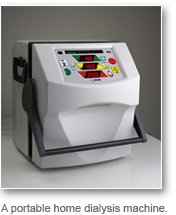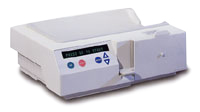Dialysis
Home Hemodialysis
 Hemodialysis involves pumping your blood through an external dialyzer to remove extra waste products and water. The cleaned blood is then pumped back into your body.
Hemodialysis involves pumping your blood through an external dialyzer to remove extra waste products and water. The cleaned blood is then pumped back into your body.
A minor outpatient surgical procedure is done by a vascular surgeon to change a vein into a fistula or graft. This fistula or graft allows two needles to be inserted during the dialysis treatment to take blood to the machine and return cleaned blood back into your body.
Advances in technology now allow patients to do Hemodialysis treatments at home. A portable home dialysis machine can be taken anywhere you need to go, even on vacation. Home Hemodialysis takes 2 ½ to 3 hours a day, 5-6 days per week. Patients on Home Hemodialysis are required to come into our office once a month for lab work. During the monthly check-up, patients will talk with a Nephrologist, Home Dialysis RN, Social Worker and Dietitian.
* The Renal Group accepts all Nephrologist’s patients for Home Dialysis. Patients can keep their current Nephrologist when receiving treatment at our office.
For more information contact our office: (330) 729-0059 or info@renalgroupohio.com.
Peritoneal Dialysis
 Peritoneal Dialysis uses your peritoneum, the space in your abdomen, as a dialyzer. The peritoneal membrane is a thin lining that covers this space inside your body and acts as a dialyzer for your blood.
Peritoneal Dialysis uses your peritoneum, the space in your abdomen, as a dialyzer. The peritoneal membrane is a thin lining that covers this space inside your body and acts as a dialyzer for your blood.
Dialysate is put into the peritoneum through a small tube called a catheter. The catheter is about the size of a straw and is put into your lower abdomen in a minor outpatient surgical procezdure. The dialysate stays in the peritoneum for about 4 hours, allowing waste products and extra water to move through the peritoneal membrane into the dialysate.
The used dialysate is drained away and replaced with fresh dialysate during each treatment – this is called an exchange. The exchange takes about 30 minutes. Patients do 4 exchanges a day. Patients opting to have their daytime free can have a machine do the exchanges over nighttime while they sleep. This is called Continuous Cycling Peritoneal Dialysis (CCPD).
